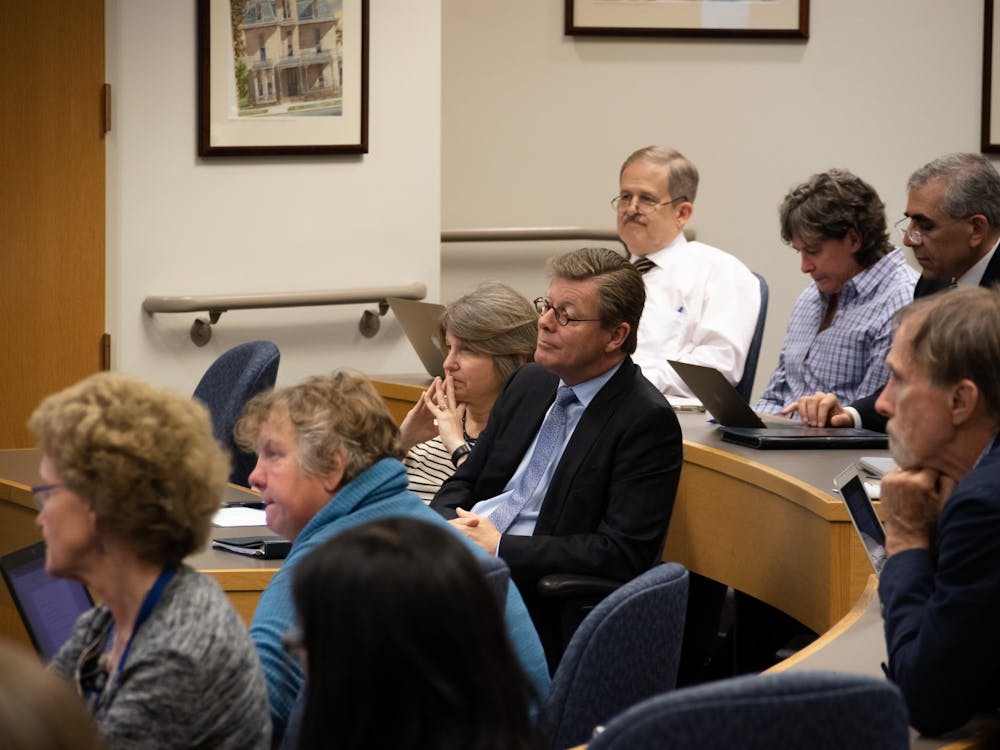In the basement of the Divinity School, professors filed into a cavernous room to discuss the future of cigarettes on campus, fundraising and differing faculty salaries Thursday at Academic Council.
James Davis, director of Duke’s Smoking Cessation Clinic, outlined the proposed addition to Duke’s 2020 smoking ban that would prohibit the use of e-cigarettes—in addition to combustible tobacco—for everyone on Duke’s campus.
The proposal comes in response to a recent national shift against e-cigarettes. Davis explained that although they appeared less harmful than combustible cigarettes, e-cigarettes have now been found to contain heavy metal and organic compounds that are carcinogenic. On Nov. 19, the American Medical Association called for a ban on vaping devices not approved by the Food and Drug Administration.
As of Nov. 21, Davis said that there were 2,300 cases of e-cigarette- and vaping-associated lung injury, and 45 deaths as a result, in which the lungs filled with proteins and made it difficult to breathe. The average age of those affected is 23. So far, Duke Hospital has treated five cases of e-cigarette/vaping associated lung injury. Davis did not know if these individuals were connected to Duke.
Currently, an estimated 21% of Duke’s undergraduate population uses e-cigarettes, he noted. This number is a clear jump from the 2.9% who already vape upon entering their first year.
“They’re learning to smoke at Duke,” Davis said.
The inclusion of e-cigarettes in the ban has been a point of contention among faculty. Recently, separate letters to the editor were published in The Chronicle for and against the proposed ban.
“E-cigarettes are very addictive, and those who switch off of smoking to e-cigarettes tend to stay on e-cigarettes,” Davis said.
The announcement of the proposed ban was met with questions from the faculty about the potential for discrimination, since many of the individuals who smoke and work on campus are African American, specifically those in the grounds and housing departments.
“This is issue number one with this policy,” Davis said in response. “Addiction is treated the same way in African American communities as in Caucasian communities. The issues are one, can you afford it, and two, can you get access to treatment? So make it as low-cost, and actually meet them where they work.”
“What we’re looking for is not to get a bunch of people in trouble but to create structures that lead people from smoking to non-smoking,” Davis explained.
Those found not complying with the ban will be guided to the smoking cessation counseling and treatment program, which has a 37.5% success rate, Davis said. He added that refusal of treatment will be considered insubordination.
David Kennedy, vice president for university development and alumni affairs, discussed the funding of upcoming projects.
At the University’s centennial in 2024, Duke will publicly launch the most ambitious fundraising in its history, Kennedy said. This will require the engagement of academic and development leaders across campus to raise endowment gifts.
The second-century campaign will prioritize school, unit and university priorities with Duke’s science and technology, which Kennedy said they are working to improve.
“We need more transformational gifts,” Kennedy said.
In the midst of these grand fundraising efforts, Duke faculty have other monetary concerns that hit closer to home, such as the Faculty Salary Equity report presentation for the 2018-2019 year.
Professor of Biomedical Engineering Craig Henriquez, a member of the Academic Council’s Faculty Compensation Committee, explained the committee’s work was to determine if there were any systemic differences in salary due to race or gender of the faculty.
After adjusting for available background characteristics, Henriquez said they did not find statistically different salaries based on race or gender. In fact, the committee has never found a statistically significant difference, he said.
“We all know there are some discrepancies in salaries, and it’s important to try to understand what those are, particularly around gender,” Henriquez said. “But if you look at it in terms of the statistical analysis, you cannot find a difference.”
However, there are disparities among the departments on campus. In general, the humanities have fewer faculty members, while the social sciences are larger. The Fuqua School of Business leads in size with 85 faculty members, followed by the School of Law with 47 and the economics department with 45.
The salaries among these departments also differ. Economics, Fuqua and Law School salaries are consistently much higher than those of the other departments. Literature is also among the top salaries, and German is the lowest. Roughly a difference of $100,000 exists in average salaries between departments, but Henriquez said this is not unique to Duke.
Among the tenure-track professors, 30% are women. Their ages range from 27 to 86, and though 13 have been on the faculty for over 50 years, the average time spent on Duke’s faculty is 15.8 years. Of these professors, the average salary is $181,300, but 1% make more than $400,000.
This was the first time that the committee separately included non-tenure track faculty, of which 53% are women. The report found that faculty not on the tenure track have an average salary of $108,000.
The committee also calculated a gender equity ratio among different departments and positions, which Henriquez acknowledged was still binary. A score of 100 would mean perfect equality in men’s and women’s salaries.
The lowest equity score of 65 was in the social sciences, specifically in economics. However, many of the equity scores were nearing 100, especially in the Pratt School of Engineering.
Timothy Reddy, associate professor of biostatistics and bioinformatics, noted that the annual survey allows faculty to track growth and progress.
“They give us updates every year,” he said. “We’re looking for trends in the right direction.”
Get The Chronicle straight to your inbox
Signup for our weekly newsletter. Cancel at any time.

Maria Morrison is a Trinity senior and a digital strategy director for The Chronicle's 117th volume. She was previously managing editor for Volume 116.

